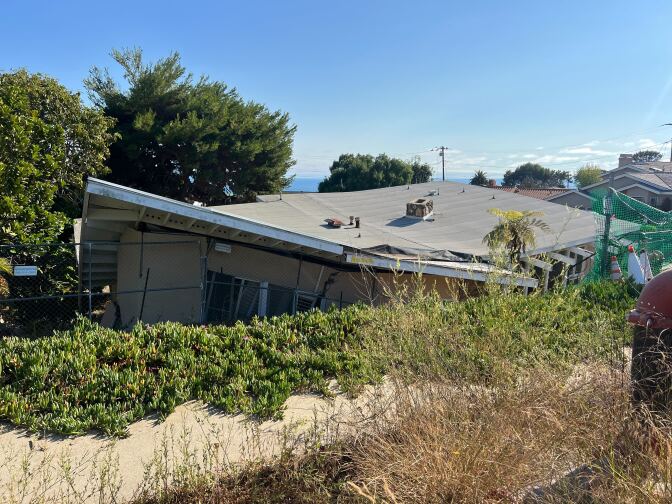This story is free to read because readers choose to support LAist. If you find value in independent local reporting, make a donation to power our newsroom today.
New construction banned in Rancho Palos Verdes landslide zones

Some of the most scenic coastal land in Southern California is now off limits for construction.
Rancho Palos Verdes city leaders on Tuesday voted unanimously to ban new construction in the landslide prone areas on the peninsula, despite opposition from many residents.
The peninsula may boast multi-million mansions and jaw-dropping views, but many residents of more humble means have their entire life savings tied up in their homes. An outright ban, they fear, goes too far and will hurt the area’s resale values.
As per city guidelines, the ordinance will come in front of the council at their Aug. 19 meeting for formality of a second reading.
How we got here
The city has had a building moratorium in place since 1978 for the landslide prone area of the peninsula.
However, over the years, the city has allowed for exceptions on a case-by-case basis. In 2002, some residents with vacant lots sued the city for the right to build on their land. And in 2008, a court ruled in their favor, paving the way for more development.
What happened next?
Above average rainfall in 2022 and 2023 set off unprecedented movement in the landslide-prone areas, city officials said. Homes were literally torn apart. Driveways buckled beyond use. Sinkholes became commonplace.
More than 20 homes have been “red tagged,” meaning they are now uninhabitable.
Worse, the rainfall collecting in the ground also activated a deeper landslide, raising the possibility of more damage in the future.
That’s why the city is extending the ban on new construction beyond the old boundaries, expanding it by around 700 acres. (Scroll down for more details about the new ban.)
What is the status of the land movement right now?
Recently, land movement has slowed down. In some areas it has measured at just 4 inches a week. (Last year, the lands were shifting by around 1 foot a week).
Despite the slowdown, city officials say the construction ban is needed.
“ The city cannot predict what the impacts will be of future rain events,” Brandy Forbes, the director of community development, said during Tuesday’s meeting. “The underlying geology is the same, so the entirety of the landslide complex is still susceptible to future movement.”
For example, one neighborhood that has been relatively unscathed by past land movement is the popular Seaview neighborhood. It has long attracted families as it affords expansive views of the Pacific Ocean and flat streets, unusual for the city where typically only hilltop homes come with a view.
But recently, a half inch fissure in the neighborhood has expanded to around 12 feet, engulfing an entire intersection.
Still, some residents say the moratorium is too expansive by encompassing areas that haven’t seen any land movement. They want city officials to maintain the flexibility to make exceptions for new construction on a case-by-case basis.
Building ban explained
Here's what the Rancho Palos Verdes construction ban in the designated areas include Seaview, Portuguese Bend Community Association and the Portuguese Bend Beach Club neighborhoods does:
- New construction of residential structures will not be allowed.
- Any permit for new construction that had previously been granted but not acted upon will be revoked.
- Residential home additions are prohibited, as are new, attached, or detached garages and larger accessory structures.
- Repair, replacement, or restoration of swimming pools is not allowed.
- Maintenance of existing structures or facilities is allowed as long as it does not increase the land acreage of the facility and does not add water usage.
- Under the new adopted ordinance, residents can still repair, restore or replace existing structures — so “like-for-like replacement” is allowed.
- Residents can also build structures such as storage sheds or barns to house animals, as long as those structures have no foundation.
- Manufactured homes will be allowed for replacement as long as it is the same square footage.
- Fences, walls and hedge permits that don't involve grading or construction of retaining walls are allowed.











